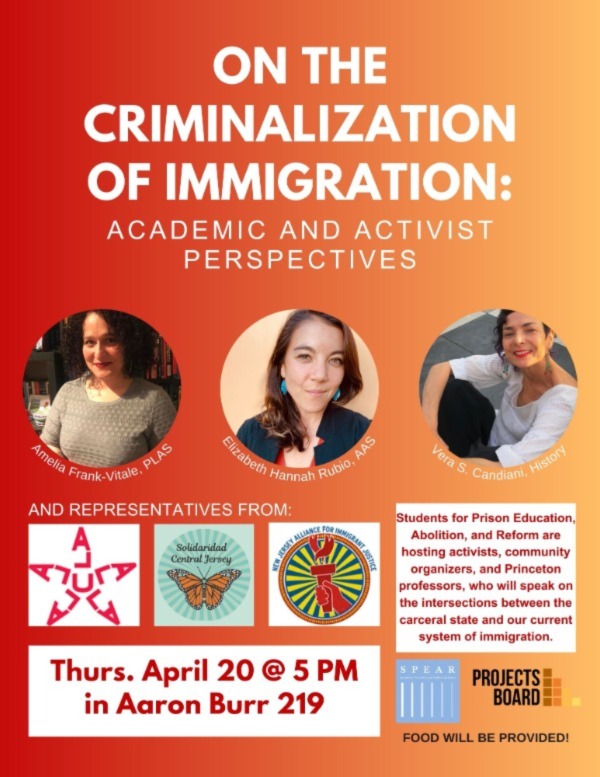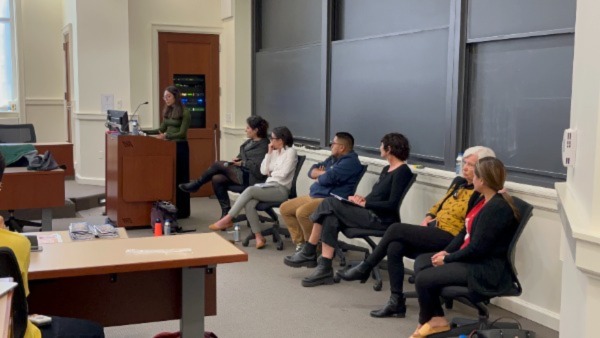Princeton Students for Prison Education, Abolition, and Reform (SPEAR) is a student group focused on educating and advocating against the carceral state of the United States. SPEAR consists of a variety of committees, including Students Against Policing, the Re-Entry Committee, and Project Solidarity. Over time, I had become very passionate about the intersections between the criminal justice and immigration systems, and was excited to learn about, and join, SPEAR’s Immigration Committee.
The Immigration Committee works closely with other organizations in central New Jersey fighting for justice for local immigrant communities. In the past, the Committee has welcomed representatives from these organizations to speak about state-wide initiatives. For example, in the Fall of 2022, we hosted various organizers to raise awareness about the New Jersey Domestic Workers Bill of Rights. SPEAR also partners often with Unidad Latina en Acción (ULA), a non-profit organization just off campus on Witherspoon Street. With ULA, Princeton students teach English as a Second Language (ESL) classes every Tuesday and Saturday, welcoming local residents to join, no matter their current English proficiency.
One of the highlights of my sophomore year was getting the opportunity to organize a panel specifically on the criminalization of immigration, or “crimmigration” as it is often called in the literature. This is the idea that, over time, immigrants in the United States have been increasingly criminalized, both in the media, but also in immigration proceedings. In the fall, I took a class called The Politics of Crime and Punishment, where my final paper had focused on this shift in immigration law and the consequences that it has had on migrant communities particularly through the lens of procedural justice. At the time of this panel, I was also taking another course with Dr. Amelia Frank-Vitale on borders. Particularly, the class explored how borders are not only geographic, but can also be reproduced by systems within a country–in this case policing.
Through our panel, we wanted to raise awareness within the student body by inviting Princeton professors to speak on the topic, as many people often don’t know about this intertwinement of criminal and immigration laws. However, we also knew gaps in knowledge can arise from looking at these sorts of issues through a purely academic lens. Therefore, over the course of two months, we set out to bring together a group of diverse perspectives and organizers, both as academics and as activists. In the end, we welcomed three Princeton professors and three representatives from local organizations, although it’s important to note that all of the professors on our panel also considered themselves to be activists. A few days before the event, we designed our flyer to circulate across campus. As I would be moderating this event, I prepared our list of questions, which ranged from asking our panelists to define “crimmigration,” as well as elaborate on what this looks like within their work, and how it affects the ways in which they carry out ethical research and activism.

Perhaps one of the reasons this panel had such a big impact on me, besides the obvious ability to share something that I care deeply about with fellow classmates, was the fact that it enabled me to see a tangible connection between the things I have learned and studied during my time at Princeton, and the sort of work that can be done, especially with the help of Princeton’s resources. I believe the ability to take the lead on these sorts of initiatives–whether it be organizing panel discussions, proposing a new volunteering experience or club, or receiving funding to engage in social impact activities–is something that is uniquely possible for Princeton students, and something I look forward to replicating in the future.







